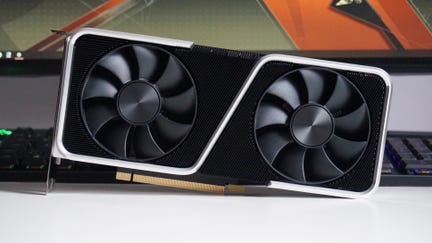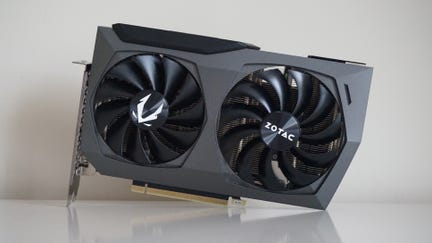Nvidia RTX 3070 vs 3060 Ti: how do they compare?
And which one is right for you?
Nvidia's new RTX 3070 and RTX 3060 Ti GPUs may still be impossible to get hold of right now, but if you've been thinking about upgrading your graphics card recently and aren't sure which one to go for when they eventually come back in stock, then you're in the right place. To help you decide which graphics card is the right one for you, I've put together some handy benchmark graphs to show you exactly how they stack up in all of today's biggest and best PC games at 1080p, 1440p and 4K.
To test the RTX 3070 and RTX 3060 Ti, I paired them with an Intel Core i5-10600K processor and 16GB of Corsair Vengeance LED RAM, and put them head to head in my suite of graphics benchmarks, taking an average frame rate from either their own built-in benchmark tools or from my own repeatable manual gameplay tests. The games include a mix of blockbusters from the last couple of years: Shadow Of The Tomb Raider, Total War: Three Kingdoms, Final Fantasy XV, Monster Hunter: World, Assassin's Creed Valhalla, The Witcher 3, Metro Exodus, and Cyberpunk 2077.
For this particular head-to-head, I've used the Nvidia Founders Edition of the RTX 3060 Ti and Zotac's GeForce RTX 3070 Twin Edge. These were the cards I used for my respective GPU reviews, and I ran both cards at their default clock speeds as they came in the box. As a result, they should be pretty representative of what their respective card categories are capable of. I should also note that these figures are based on their raw performance in each of these games, with all ray tracing and DLSS options switched off. Here's how they got on.
Nvidia RTX 3070 vs 3060 Ti: 1080p benchmarks
Starting with their 1920x1080 performance, you can see straight away that both of these cards are more than capable of playing games on max settings at this resolution, hitting at least 70fps (or thereabouts) in 2020's most demanding PC games, Assassin's Creed Valhalla and Cyberpunk 2077, and well in excess of 100fps in 2018 and 2019's big games.
In a lot of cases, the RTX 3070 offers around a 10-20fps improvement over the RTX 3060 Ti, although there are a fair few instances where that gap is much narrower. In Final Fantasy XV, for example, both cards managed an identical average of 103fps with all of the extra Nvidia settings turned off at this resolution. I should note, the RTX 3070 regained its 10-odd fps lead once I switched on all of those aforementioned effects, averaging 82fps versus the RTX 3060 Ti's 73fps, but when it comes to the game's default Highest settings, they're both much of a muchness. Assassin's Creed Valhalla is very close, too, with an average of just 3fps between each card.
Admittedly, this is likely down to my choice of processor than a problem with the RTX 3070's performance per se. While my Intel Core i5-10600K is pretty powerful compared to previous generations of Intel's Core i5 chips, 1920x1080 is still a resolution where your CPU can make a surprising amount of difference to your PC's overall performance. Due to the sheer amount of power available in today's RTX cards, games are much more likely to be bound by the limitations of your CPU at this resolution than your GPU. As such, you'd likely see better results from the RTX 3070 here with a faster CPU.
Equally, though, if you're not in possession of a high refresh rate monitor, then any difference between these two cards will be lost completely anyway. What's more, I'm not sure even I could discern the difference between 100fps and 110fps without the aid of a frame rate counter, say, so those playing games at 1080p would probably be better off sticking with the RTX 3060 Ti instead of spending any extra on the RTX 3070.
Nvidia RTX 3070 vs 3060 Ti: 1440p benchmarks
Indeed, it's only when we move up to 2560x1440 that the RTX 3070 starts to make a clearer case for itself. Once again, both cards are more than capable of playing games on max settings at this resolution, and in most cases the RTX 3070 is out in front with a similar 10fps lead on the RTX 3060 Ti.
There are still a couple of cases where the gap narrows, primarily in more recent games such as Assassin's Creed Valhalla and Cyberpunk 2077, but elsewhere the RTX 3070's lead is much plainer. Again, it's unlikely you'll notice much of a difference between the two cards in the short term without the aid of a high refresh rate monitor, as even the RTX 3060 Ti can reach a smooth average of 60fps in even today's most demanding games - and that includes Cyberpunk 2077 once you enable Nvidia's DLSS tech.
In the long term, though, the RTX 3070 will likely offer more future-proofing than the RTX 3060 Ti for Ultra quality fiends, especially when it comes to staying firmly above the 60fps line. With games such as Assassin's Creed Valhalla and Total War: Three Kingdoms already pushing the RTX 3060 Ti just below 60fps on max settings, those numbers are only likely to fall further as games get progressively more demanding. The extra horsepower afforded by the RTX 3070, on the other hand, will almost certainly let you carry on playing games at 60fps on max settings for a little while longer - although quite how much longer is difficult to say given that Valhalla still has its fair share of dips below the 60fps mark.
Of course, that's not to say the RTX 3060 Ti will become completely defunct in a year or two. Indeed, if you're happy dropping the settings down to High at 1440p, the RTX 3060 Ti should still be able to hit well in excess of 60fps for a long time yet. With averages of 86fps in Total War: Three Kingdoms on High, as well as 68fps in Assassin's Creed Valhalla and 81fps in Metro Exodus, the RTX 3060 Ti still has more than enough horsepower left to play games at 1440p for several years to come.
Nvidia RTX 3070 vs 3060 Ti: 4K benchmarks
However, if it's playing games at 3840x2160 that's more your bag, then the RTX 3070 is definitely the clear winner here. As you can see below, the RTX 3060 Ti puts up a pretty decent fight at 4K, hitting around 60fps on Medium settings in almost all of today's big games (save Cyberpunk 2077, of course). That's pretty good going for a card of this calibre, especially when you consider that just a couple of years ago you'd have had to pay more than double what the RTX 3060 Ti currently costs to get the same kind of performance.
However, if it's only just about managed a smooth 60fps on Medium now, it probably won't be long before you're forced to knock things down to Low with the RTX 3060 Ti, and nobody wants that, do they? At that point, you may as well go back to playing games at 2560x1440 with much prettier-looking graphics.
The RTX 3070, on the other hand, is much better equipped for playing games at 4K. Again, newer titles such as Assassin's Creed Valhalla and Cyberpunk 2077 still put quite the strain on it at this resolution (although Cyberpunk 2077 does at least have DLSS support to help bump up the frame rate slightly), but older games are all right up there around the 70fps mark. Raise the quality setting to High and you're looking at a smooth 60fps in a lot of games, too - or higher if you enable DLSS support.
The RTX 3060 Ti benefits from DLSS, too, of course. Indeed, in Shadow Of The Tomb Raider, it can hit an impressive average of 64fps on Highest at 4K with DLSS switched on, as well as a very agreeable 62fps on High in Final Fantasy XV. Monster Hunter: World's DLSS support allows the RTX 3060 Ti to push up to High, too, hitting an average of 73fps. They're impressive figures, to be sure, but unless the number of DLSS games grows substantially over the next couple of years, it's much more likely that you'll be playing games on Medium or Low settings given its current performance capabilities in games in with no DLSS support.
Nvidia RTX 3070 vs 3060 Ti: conclusion
All in all, I reckon that unless you're dead set on playing games at max settings all the time, then the RTX 3060 Ti is definitely the card to go for here. At £369 / $399, it's quite a bit cheaper than the £469 / $499 RTX 3070 (or at least they should be once prices and stock levels come back to normal), and you're still getting 60fps+ speeds at both 1080p and 1440p in practically all of today's biggest PC games.
Plus, unless you're particularly sensitive to frame rate speeds over 60fps, I'm not sure you're really going to notice the difference between these two cards once you're into the realms of hitting 80-100fps. I certainly can't distinguish between these sorts of frame rates without the aid of a frame rate counter, so you might as well save yourself some cash in the process and put the extra £100 / $100 toward something else for your PC like a nice 1TB SSD.
The RTX 3070 is worth considering if you're going to be playing games at 4K, of course, and it would also be my top Nvidia recommendation for playing games on ultrawide gaming monitors, too. For those with regular 1080p or 1440p monitors, though, the RTX 3060 Ti offers more than enough performance here, and is likely to keep you going at high frame rates for many years to come.
For more GPU comparisons check out:
- Nvidia GTX 1650 vs 1050 Ti
- Nvidia GTX 1650 vs 1060
- Nvidia GTX 1650 vs AMD RX 570
- Nvidia GTX 1660 vs 1060
- Nvidia GTX 1660 vs 1660 Super
- Nvidia GTX 1660 vs 1660 Ti
- Nvidia GTX 1660 Super vs 1060
- Nvidia GTX 1660 Super vs 1660 Ti
- Nvidia GTX 1660 Ti vs 1060
- Nvidia GTX 1660 Ti vs 1070
- Nvidia GTX 1660 Ti vs RTX 2060
- Nvidia RTX 2060 vs GTX 1060
- Nvidia RTX 2060 vs 2060 Super vs AMD RX 5700 vs RX 5700 XT
- Nvidia RTX 2070 vs 2070 Super vs AMD RX 5700 XT
- Nvidia RTX 2070 Super vs 2080 Super
- Nvidia RTX 2080 vs GTX 1080
- Nvidia RTX 2080 Ti vs GTX 1080 Ti
- Nvidia RTX 3080 vs 2080 vs 2080 Super
- Nvidia RTX 3060 Ti vs RTX 3070
- Nvidia RTX 3070 vs 3080
- Nvidia RTX 3080 vs 2080 Ti
- AMD RX 5600 XT vs RX 5700
- AMD RX 6800 vs RX 6800 XT





